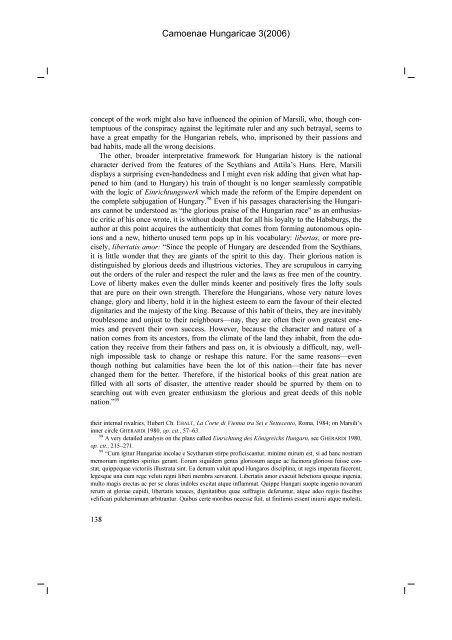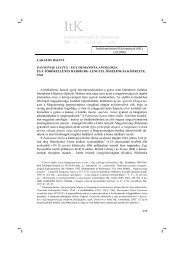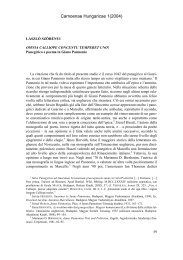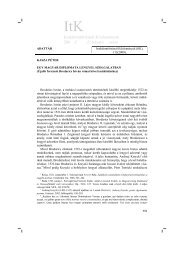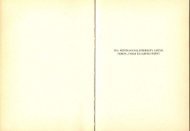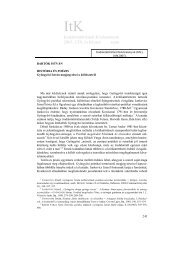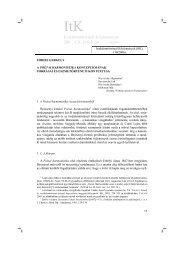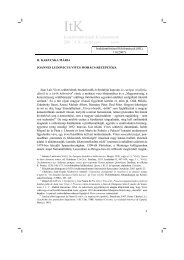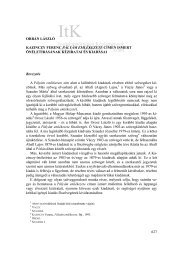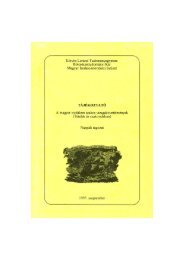Camoenae Hungaricae 3(2006) - Irodalomtörténeti Közlemények
Camoenae Hungaricae 3(2006) - Irodalomtörténeti Közlemények
Camoenae Hungaricae 3(2006) - Irodalomtörténeti Közlemények
You also want an ePaper? Increase the reach of your titles
YUMPU automatically turns print PDFs into web optimized ePapers that Google loves.
concept of the work might also have influenced the opinion of Marsili, who, though contemptuous<br />
of the conspiracy against the legitimate ruler and any such betrayal, seems to<br />
have a great empathy for the Hungarian rebels, who, imprisoned by their passions and<br />
bad habits, made all the wrong decisions.<br />
The other, broader interpretative framework for Hungarian history is the national<br />
character derived from the features of the Scythians and Attila’s Huns. Here, Marsili<br />
displays a surprising even-handedness and I might even risk adding that given what happened<br />
to him (and to Hungary) his train of thought is no longer seamlessly compatible<br />
with the logic of Einrichtungswerk which made the reform of the Empire dependent on<br />
the complete subjugation of Hungary. 98 Even if his passages characterising the Hungarians<br />
cannot be understood as “the glorious praise of the Hungarian race” as an enthusiastic<br />
critic of his once wrote, it is without doubt that for all his loyalty to the Habsburgs, the<br />
author at this point acquires the authenticity that comes from forming autonomous opinions<br />
and a new, hitherto unused term pops up in his vocabulary: libertas, or more precisely,<br />
libertatis amor: “Since the people of Hungary are descended from the Scythians,<br />
it is little wonder that they are giants of the spirit to this day. Their glorious nation is<br />
distinguished by glorious deeds and illustrious victories. They are scrupulous in carrying<br />
out the orders of the ruler and respect the ruler and the laws as free men of the country.<br />
Love of liberty makes even the duller minds keener and positively fires the lofty souls<br />
that are pure on their own strength. Therefore the Hungarians, whose very nature loves<br />
change, glory and liberty, hold it in the highest esteem to earn the favour of their elected<br />
dignitaries and the majesty of the king. Because of this habit of theirs, they are inevitably<br />
troublesome and unjust to their neighbours—nay, they are often their own greatest enemies<br />
and prevent their own success. However, because the character and nature of a<br />
nation comes from its ancestors, from the climate of the land they inhabit, from the education<br />
they receive from their fathers and pass on, it is obviously a difficult, nay, wellnigh<br />
impossible task to change or reshape this nature. For the same reasons—even<br />
though nothing but calamities have been the lot of this nation—their fate has never<br />
changed them for the better. Therefore, if the historical books of this great nation are<br />
filled with all sorts of disaster, the attentive reader should be spurred by them on to<br />
searching out with even greater enthusiasm the glorious and great deeds of this noble<br />
nation.” 99<br />
their internal rivalries, Hubert Ch. EHALT, La Corte di Vienna tra Sei e Settecento, Roma, 1984; on Marsili’s<br />
inner circle GHERARDI 1980, op. cit., 57–63.<br />
98<br />
A very detailed analysis on the plans called Einrichtung des Königreichs Hungarn, see GHERARDI 1980,<br />
op. cit., 215–271.<br />
99<br />
“Cum igitur Hungariae incolae e Scytharum stirpe proficiscantur, minime mirum est, si ad hanc nostram<br />
memoriam ingentes spiritus gerant. Eorum siquidem genus gloriosum aeque ac facinora gloriosa fuisse constat,<br />
quippequae victoriis illustrata sint. Ea demum valuit apud Hungaros disciplina, ut regis imperata facerent,<br />
legesque una cum rege veluti regni liberi membra servarent. Libertatis amor exacuit hebetiora quoque ingenia,<br />
multo magis erectas ac per se claras indoles excitat atque inflammat. Quippe Hungari suopte ingenio novarum<br />
rerum at gloriae cupidi, libertatis tenaces, dignitatibus quae suffragiis deferuntur, atque adeo regiis fascibus<br />
velificari pulcherrimum arbitrantur. Quibus certe moribus necesse fuit, ut finitimis essent iniurii atque molesti,<br />
138<br />
<strong>Camoenae</strong> <strong>Hungaricae</strong> 3(<strong>2006</strong>)


